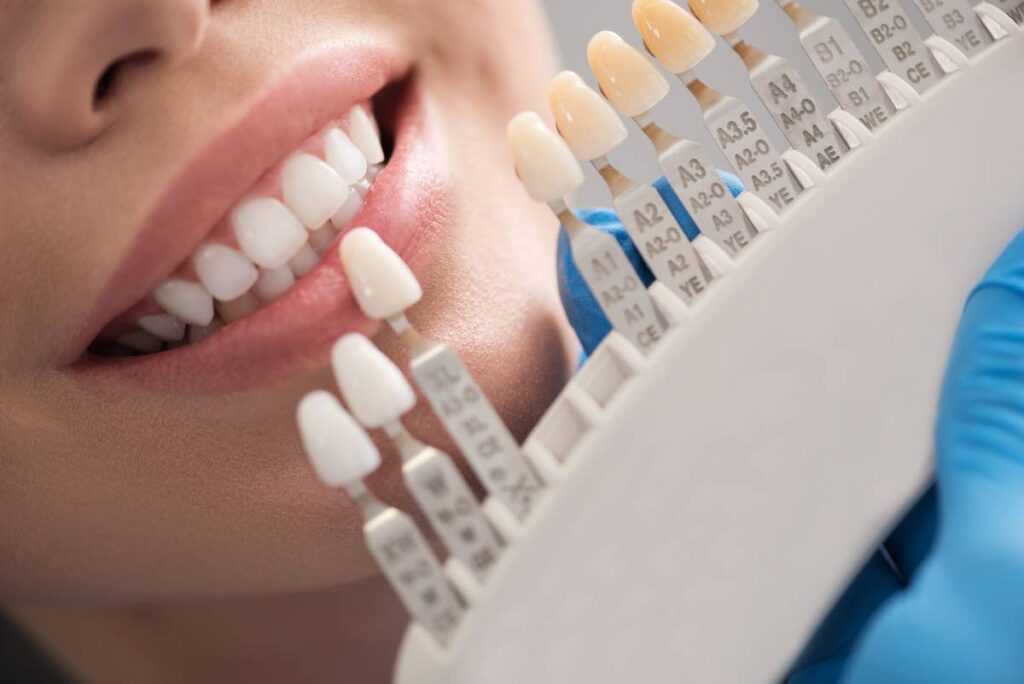A healthy, beautiful smile is an asset that contributes to both our physical well-being and self-confidence. However, our teeth can become damaged due to various reasons, such as decay, injury, or wear over time. When this happens, dental crowns offer a reliable solution to restore both the function and appearance of damaged teeth. In this comprehensive guide, we’ll explore what dental crowns are, how they work, and the many ways they can save your damaged teeth.
Understanding Dental Crowns
A dental crown, also known as a cap, is a custom-made restoration that covers the entire visible portion of a tooth above the gum line. Crowns are designed to mimic the shape, size, and colour of natural teeth, providing both functional and aesthetic benefits. They are typically made from durable materials such as porcelain, ceramic, metal alloys, or a combination of these materials.
The Purpose of Dental Crowns
Dental crowns serve several important purposes:
Protection
Crowns shield weakened or damaged teeth from further decay or injury.
Restoration
They restore the shape, size, and function of damaged teeth.
Cosmetic Enhancement
Crowns can improve the appearance of discoloured, misshapen, or unattractive teeth.
Support
They can hold together parts of a cracked tooth or support a tooth with a large filling.
Replacement
Crowns are used to top dental implants, replacing missing teeth.
When Are Dental Crowns Necessary?
Dental crowns may be recommended in various situations, including:
- Large cavities that can’t be adequately treated with fillings
- Severely worn down or eroded teeth
- Cracked or fractured teeth
- After root canal treatment to protect the restored tooth
- To cover dental implants
- To support dental bridges
- For cosmetic reasons, such as covering severely discoloured or misshapen teeth
The Dental Crown Procedure
Getting a dental crown typically involves two appointments:
First Appointment
Examination and preparation
Your dentist will examine the tooth and prepare it for the crown. This may involve removing decay, old fillings, and shaping the tooth to accommodate the crown.
Impressions
Detailed impressions of your teeth are taken to create a custom-fitted crown.
Temporary crown
A temporary crown is placed to protect the prepared tooth while the permanent crown is being fabricated.
Second Appointment
Removal of the temporary crown
The temporary crown is removed.
Fitting the permanent crown
The new crown is checked for fit, shape, and colour match.
Cementing
Once any necessary adjustments are made, the crown is permanently cemented.
Types of Dental Crowns
There are several types of dental crowns, each with its own advantages:
Porcelain or Ceramic Crowns
Most natural-looking option
Ideal for front teeth
Metal-free, suitable for those with metal allergies
Porcelain-Fused-to-Metal (PFM) Crowns
Combine the strength of metal with the aesthetics of porcelain
Suitable for both front and back teeth
It may show a dark line at the gum if the gums recede
Metal Crowns (Gold or Alloys)
Extremely durable
Require less tooth structure removal
Ideal for back teeth due to their appearance
Zirconia Crowns
Very strong and durable
Natural-looking
Suitable for both front and back teeth
Resin Crowns
Less expensive option
Not as durable as other types
It may wear down more quickly
How Dental Crowns Save Damaged Teeth
Dental crowns play a crucial role in saving damaged teeth in several ways:
Preventing Further Decay
By covering the entire tooth, crowns protect against bacteria and plaque, preventing further decay in teeth that have been extensively damaged by cavities.
Strengthening Weakened Teeth
Teeth that have undergone root canal treatment or have large fillings can become weak and prone to fractures. Crowns provide structural support, distributing bite forces evenly and preventing the tooth from breaking.
Holding Fragmented Teeth Together
In cases of cracked or fractured teeth, crowns can hold the pieces together, preventing further damage and potentially saving the tooth from extraction.
Restoring Function
Severely worn or damaged teeth can affect your ability to chew properly. Crowns restore the shape and size of these teeth, allowing for normal chewing function.
Protecting Sensitive Teeth
Crowns provide a protective barrier against tooth sensitivity caused by enamel erosion or decay, reducing sensitivity and discomfort.
Salvaging Teeth After Root Canal Treatment
After a root canal, teeth often become brittle and prone to fractures. Crowns protect these teeth, allowing them to remain functional for many years.
Improving Aesthetics
Crowns can save teeth that might otherwise be considered for extraction due to their unsightly appearance by restoring the appearance of damaged, discoloured, or misshapen teeth.
Benefits of Choosing Dental Crowns
Opting for dental crowns offers numerous benefits:
Longevity
With proper care, dental crowns can last 10-15 years or even longer.
Natural Appearance
Modern crowns are designed to look just like natural teeth.
Improved Oral Health
Crowns help maintain overall oral health by protecting damaged teeth.
Boost in Confidence
Restoring damaged teeth can significantly improve your smile and self-esteem.
Versatility
Crowns can address a wide range of dental issues, from structural problems to cosmetic concerns.
Caring for Your Dental Crowns
To ensure the longevity of your dental crowns and maintain good oral health:
Practice good oral hygiene.
Brush twice daily and floss regularly, paying special attention to the crown-tooth interface.
Avoid hard foods
Refrain from chewing on ice or very hard foods that could damage the crown.
Wear a night guard
If you grind your teeth at night, a custom night guard can protect your crowns and natural teeth.
Regular dental check-ups
Visit your dentist regularly for professional cleanings and to monitor the condition of your crowns.
Potential Drawbacks and Considerations
While dental crowns are an excellent solution for many dental problems, there are some considerations to keep in mind:
Cost
Dental crowns can be expensive, especially if multiple teeth need treatment.
Tooth Sensitivity
Some people may experience increased sensitivity to hot and cold immediately after getting a crown, though this usually subsides.
Potential for Chips or Cracks
While rare, crowns can chip or crack and may need replacement.
Not a Permanent Solution
Crowns typically need to be replaced after 10-15 years, depending on wear and care.
Experience Being a Royalty at Mint Dental Today!
Dental crowns are a versatile and effective solution for saving damaged teeth. They offer a way to restore both the function and appearance of teeth that have been compromised by decay, injury, or wear. Crowns play a crucial role in modern dentistry by protecting weakened teeth, preventing further damage, and improving overall oral health.
If you have damaged teeth, consulting with a qualified dentist about the possibility of dental crowns could be the first step towards a healthier, more confident smile. Remember, early intervention is key in dental health, and addressing damaged teeth promptly with solutions like crowns can prevent more serious issues down the line.
With proper care and regular dental check-ups, dental crowns can provide a long-lasting solution, allowing you to maintain a beautiful, functional smile for years to come. Don’t let damaged teeth hold you back – explore the possibility of dental crowns and take the first step towards reclaiming your oral health and confidence.





